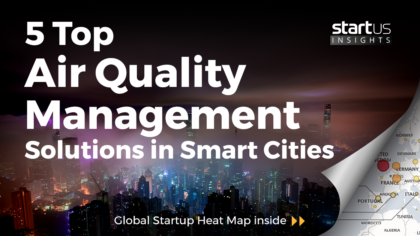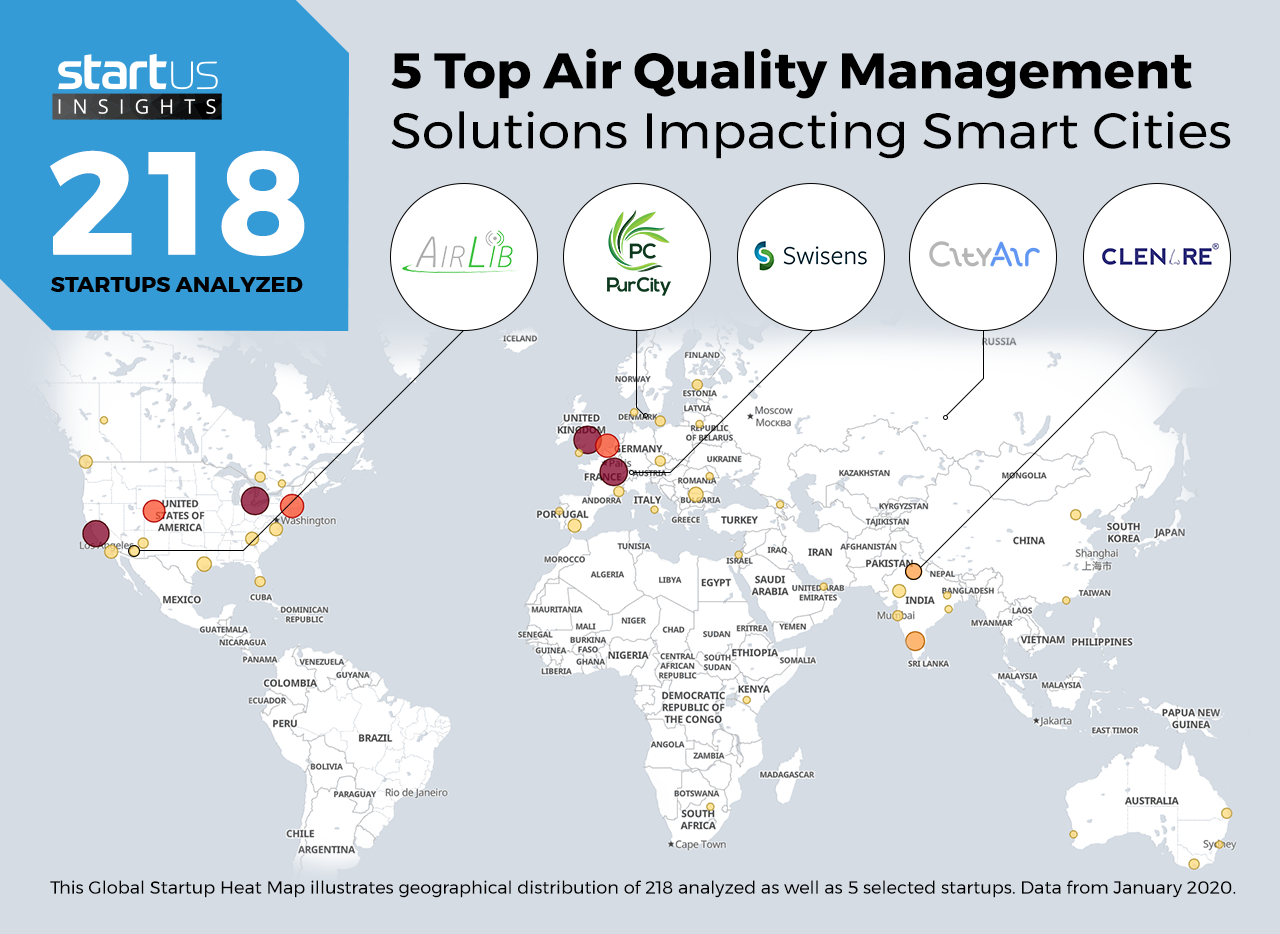Our Innovation Analysts recently looked into emerging technologies and up-and-coming startups working on solutions for Smart Cities. As there is a large number of startups working on a wide variety of solutions, we want to share our insights with you. This time, we are taking a look at 5 promising Air Quality Management solutions.
Heat Map: 5 Top Air Quality Management Solutions
For our 5 top picks, we used a data-driven startup scouting approach to identify the most relevant solutions globally. The Global Startup Heat Map below highlights 5 interesting examples out of 218 relevant solutions. Depending on your specific needs, your top picks might look entirely different.
Swisens – Continuous Monitoring
With increasing levels of air pollution over the last decades, cities are looking for smart ways to track air quality and composition to maintain the quality of air. One way to do this involves continuous real-time monitoring of gaseous structure, contaminants, and specific compounds or particles using a network of advanced sensors.
Swiss startup Swisens manufactures long-term city air quality monitoring stations featuring remote control and status updates. Their product, Poleno, detects aerosols, allergens, and pollens in real-time based on light spectroscopy, polarization, and holographic imagery.
AirLib – Data Analytics
Conventional air quality observation practices primarily focus on collecting quantitative data, while putting less emphasis on qualitative findings. In contrast, air quality data analytics in smart cities focuses on extracting precious and practical insights. This is then used to create urban air mapping and navigation, enhance awareness, and aid local decision-making.
The US-based startup AirLib offers an air quality intelligence platform. It utilizes automotive sensor data to create air maps for urban environments. These can be used to warn inhabitants about traffic pollution and recommend them more air-safe city routes.
City Air – Data Simulation
Air quality data simulation helps to deep-dive into the processes happening in smart cities at the level of air molecules. Dynamic and static data modeling allows for pinpointing bottlenecks and determining major factors that influence urban air and finally contribute to quality management optimization.
Russian startup City Air develops simulation models that provide insights into air quality. These models identify contamination sources, quantify optimal city-wide sensor network layouts, estimate the impact of city planning efforts, and create air pollution forecasts.
PurCity – Urban Air Purification
Urban air purification aims at amplifying the impact of green infrastructure or new materials on the ecosystem of smart cities. Urban purifiers neutralize harmful emission thanks to their natural or artificial properties, e.g. photosynthesis in green infrastructure objects, various mechanical, biological, and chemical filters, pollution management systems, etc. As a result, they strengthen the protection of smart cities against air contaminants.
Denmark-based startup PurCity develops proprietary recyclable air-purification panels for new and retrofit building facades, as well as bus stops. Their solution, GapS, transforms city walls into massive air purifiers by incorporating pollution control, smart maintenance, and self-cleaning features.
Clenare – Personal Wearables
With frequent occurrences of smog in modern cities and rising concerns regarding breathing disorders, smart city inhabitants face more air-related threats. In turn, they indirectly nudge demand for personalized air sensors and nasal wearables to increase individual safety. With the help of these devices, people become more environmentally aware and take control of the quality of the surrounding air.
Indian startup Clenare offers durable personal nasal wearables, made of flexible medical grade material. The product grants protection from outdoor & indoor air contaminants, urban emissions from vehicles and industrial plants, dust, mold, and allergens, therefore, improving breathing air quality.
What About The Other 213 Solutions?
While we believe data is key to creating insights it can be easy to be overwhelmed by it. Our ambition is to create a comprehensive overview and provide actionable innovation intelligence for your Proof of Concept (PoC), partnership, or investment targets. The 5 air quality management solutions showcased above are promising examples out of 218 we analyzed for this article. To identify the most relevant solutions based on your specific criteria and collaboration strategy, get in touch.









